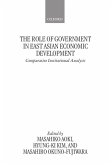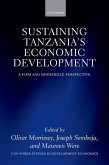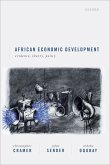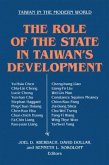Role of Elites in Economic Development
Herausgeber: Amsden, Alice H; Robinson, James A; DiCaprio, Alisa
Role of Elites in Economic Development
Herausgeber: Amsden, Alice H; Robinson, James A; DiCaprio, Alisa
- Gebundenes Buch
- Merkliste
- Auf die Merkliste
- Bewerten Bewerten
- Teilen
- Produkt teilen
- Produkterinnerung
- Produkterinnerung
Elites play a crucial role in the development process. The impact they have on growth and development exceeds their representation within a country. This volume uses case studies from South Africa to China to seek an understanding of the relationship between elites and economic development.
Andere Kunden interessierten sich auch für
![The Role of Government in East Asian Economic Development The Role of Government in East Asian Economic Development]() Masahiko Aoki / Hyung-Ki Kim / Masahiro Okuno-Fujiwara (eds.)The Role of Government in East Asian Economic Development305,99 €
Masahiko Aoki / Hyung-Ki Kim / Masahiro Okuno-Fujiwara (eds.)The Role of Government in East Asian Economic Development305,99 €![Sustaining Tanzania's Economic Development Sustaining Tanzania's Economic Development]() Sustaining Tanzania's Economic Development115,99 €
Sustaining Tanzania's Economic Development115,99 €![African Economic Development African Economic Development]() Christopher CramerAfrican Economic Development83,99 €
Christopher CramerAfrican Economic Development83,99 €![Turbulence and Order in Economic Development Turbulence and Order in Economic Development]() Hazel GrayTurbulence and Order in Economic Development126,99 €
Hazel GrayTurbulence and Order in Economic Development126,99 €![Capital and Ideology Capital and Ideology]() Thomas PikettyCapital and Ideology41,99 €
Thomas PikettyCapital and Ideology41,99 €![The Role of the State in Development Processes The Role of the State in Development Processes]() Claude Auroi (ed.)The Role of the State in Development Processes137,99 €
Claude Auroi (ed.)The Role of the State in Development Processes137,99 €![The Role of the State in Taiwan's Development The Role of the State in Taiwan's Development]() Joel D AberdachThe Role of the State in Taiwan's Development197,99 €
Joel D AberdachThe Role of the State in Taiwan's Development197,99 €-
-
-
Elites play a crucial role in the development process. The impact they have on growth and development exceeds their representation within a country. This volume uses case studies from South Africa to China to seek an understanding of the relationship between elites and economic development.
Hinweis: Dieser Artikel kann nur an eine deutsche Lieferadresse ausgeliefert werden.
Hinweis: Dieser Artikel kann nur an eine deutsche Lieferadresse ausgeliefert werden.
Produktdetails
- Produktdetails
- Verlag: Oxford University Press
- Seitenzahl: 398
- Erscheinungstermin: 25. November 2012
- Englisch
- Abmessung: 236mm x 160mm x 28mm
- Gewicht: 726g
- ISBN-13: 9780199659036
- ISBN-10: 0199659036
- Artikelnr.: 35938059
- Herstellerkennzeichnung
- Libri GmbH
- Europaallee 1
- 36244 Bad Hersfeld
- gpsr@libri.de
- Verlag: Oxford University Press
- Seitenzahl: 398
- Erscheinungstermin: 25. November 2012
- Englisch
- Abmessung: 236mm x 160mm x 28mm
- Gewicht: 726g
- ISBN-13: 9780199659036
- ISBN-10: 0199659036
- Artikelnr.: 35938059
- Herstellerkennzeichnung
- Libri GmbH
- Europaallee 1
- 36244 Bad Hersfeld
- gpsr@libri.de
Alice Amsden (now deceased) was Barton L. Weller Professor of Development Economics at the Massachusetts Institute of Technology. She authored Asia's Next Giant and the Rise of 'The Rest'. Most recently, she criticized the 'capabilities' approach to poverty alleviation, arguing that healthier and more educated job seekers cannot get jobs because there are none, and they cannot lower their subsistence wage any further. Some of her last work, alongside co-directing the UNU-WIDER research project and co-editing the resulting volume on the role of elites, was on a manuscript entitled 'The Rational Revolution: Learning from Role Models, Deserting Deductive Theory', which maintains that countries develop by studying what each other do, not from poring over Enlightenment propositions in their orthodox or modern manifestation. Alisa DiCaprio is a Research Fellow at United Nations University's World Institute for Development Economics Research. Prior to joining UNU-WIDER, she was a Post-Doctoral Fellow at New York University's Alexander Hamilton Center for Political Economy. In addition to her academic work, she has worked in the public and private sector supporting US trade policy, researching emerging market opportunities for exporters, and organizing unions in the healthcare sector. James Robinson is David Florence Professor of Government at Harvard University and a faculty associate at the Institute for Quantitative Social Science. Professor Robinson studied economics at the London School of Economics, the University of Warwick, and Yale University. He previously taught in the Department of Economics at the University of Melbourne and the University of Southern California. Before moving to Harvard he was a Professor in the Departments of Economics and Political Science at the University of California at Berkeley. His main research interest is the political economy of development with a particular interest in Latin America and Sub-Saharan Africa.
* 1: Alisa DiCaprio: Introduction: The Role of Elites in Economic
Development
* Part I: Theoretical Considerations
* 2: Alice H. Amsden: Elites and Property Rights
* 3: James A. Robinson: Elites and Institutional Persistence
* Part II: The Formation and Circulation of Elites
* 4: Andres Solimano and Diego Avanzini: The International Circulation
of Elites: Knowledge, Entrepreneurial, and Political
* 5: Johan Fourie and Dieter von Fintel: Fruit of the Vine? An
Augmented Endowments-Inequality Hypothesis and the Rise of an Elite
in the Cape Colony
* 6: Alison Wolf: Two for the Price of One? The Contribution to
Development of the New Female Elites
* 7: Bjorn Gustafsson and Sai Ding: New Light on China's Rural Elites
* Part III: The Preferences of Elites
* 8: Elisa P. Reis: Poverty in the Eyes of Brazilian Elites
* 9: Chipiliro Kalebe-Nyamongo: Mutual Interdependence between Elites
and the Poor
* 10: Xiaowei Zang: Why Are the Elite in China Motivated and Able to
Promote Growth?
* Part IV: Elites and State Capactiy
* 11: Francois Bourguignon and Thierry Verdier: The Simple Analytics of
Elite Behaviour under Limited State Capacity
* 12: Thomas Cantens: Is it Possible to Reform a Customs
Administration? The Role of the Customs Elite on the Reform Process
in Cameroon
* 13: Monica Pinhanez: Rekindling Governments from Within: Getting
Public Sector Elite Officials to Support Government Reform in Brazil
* Part V: Grassroots Responses to Elites
* 14: Sam Wong: Tackling Elite Capture by the 'Counter-elite' and
'Co-opt-elite' Approaches in Bangladesh and Ghana
* 15: Alice H. Amsden and Alisa DiCaprio: Understanding the Dynamics of
Elite Behaviour in a Development Context
Development
* Part I: Theoretical Considerations
* 2: Alice H. Amsden: Elites and Property Rights
* 3: James A. Robinson: Elites and Institutional Persistence
* Part II: The Formation and Circulation of Elites
* 4: Andres Solimano and Diego Avanzini: The International Circulation
of Elites: Knowledge, Entrepreneurial, and Political
* 5: Johan Fourie and Dieter von Fintel: Fruit of the Vine? An
Augmented Endowments-Inequality Hypothesis and the Rise of an Elite
in the Cape Colony
* 6: Alison Wolf: Two for the Price of One? The Contribution to
Development of the New Female Elites
* 7: Bjorn Gustafsson and Sai Ding: New Light on China's Rural Elites
* Part III: The Preferences of Elites
* 8: Elisa P. Reis: Poverty in the Eyes of Brazilian Elites
* 9: Chipiliro Kalebe-Nyamongo: Mutual Interdependence between Elites
and the Poor
* 10: Xiaowei Zang: Why Are the Elite in China Motivated and Able to
Promote Growth?
* Part IV: Elites and State Capactiy
* 11: Francois Bourguignon and Thierry Verdier: The Simple Analytics of
Elite Behaviour under Limited State Capacity
* 12: Thomas Cantens: Is it Possible to Reform a Customs
Administration? The Role of the Customs Elite on the Reform Process
in Cameroon
* 13: Monica Pinhanez: Rekindling Governments from Within: Getting
Public Sector Elite Officials to Support Government Reform in Brazil
* Part V: Grassroots Responses to Elites
* 14: Sam Wong: Tackling Elite Capture by the 'Counter-elite' and
'Co-opt-elite' Approaches in Bangladesh and Ghana
* 15: Alice H. Amsden and Alisa DiCaprio: Understanding the Dynamics of
Elite Behaviour in a Development Context
* 1: Alisa DiCaprio: Introduction: The Role of Elites in Economic
Development
* Part I: Theoretical Considerations
* 2: Alice H. Amsden: Elites and Property Rights
* 3: James A. Robinson: Elites and Institutional Persistence
* Part II: The Formation and Circulation of Elites
* 4: Andres Solimano and Diego Avanzini: The International Circulation
of Elites: Knowledge, Entrepreneurial, and Political
* 5: Johan Fourie and Dieter von Fintel: Fruit of the Vine? An
Augmented Endowments-Inequality Hypothesis and the Rise of an Elite
in the Cape Colony
* 6: Alison Wolf: Two for the Price of One? The Contribution to
Development of the New Female Elites
* 7: Bjorn Gustafsson and Sai Ding: New Light on China's Rural Elites
* Part III: The Preferences of Elites
* 8: Elisa P. Reis: Poverty in the Eyes of Brazilian Elites
* 9: Chipiliro Kalebe-Nyamongo: Mutual Interdependence between Elites
and the Poor
* 10: Xiaowei Zang: Why Are the Elite in China Motivated and Able to
Promote Growth?
* Part IV: Elites and State Capactiy
* 11: Francois Bourguignon and Thierry Verdier: The Simple Analytics of
Elite Behaviour under Limited State Capacity
* 12: Thomas Cantens: Is it Possible to Reform a Customs
Administration? The Role of the Customs Elite on the Reform Process
in Cameroon
* 13: Monica Pinhanez: Rekindling Governments from Within: Getting
Public Sector Elite Officials to Support Government Reform in Brazil
* Part V: Grassroots Responses to Elites
* 14: Sam Wong: Tackling Elite Capture by the 'Counter-elite' and
'Co-opt-elite' Approaches in Bangladesh and Ghana
* 15: Alice H. Amsden and Alisa DiCaprio: Understanding the Dynamics of
Elite Behaviour in a Development Context
Development
* Part I: Theoretical Considerations
* 2: Alice H. Amsden: Elites and Property Rights
* 3: James A. Robinson: Elites and Institutional Persistence
* Part II: The Formation and Circulation of Elites
* 4: Andres Solimano and Diego Avanzini: The International Circulation
of Elites: Knowledge, Entrepreneurial, and Political
* 5: Johan Fourie and Dieter von Fintel: Fruit of the Vine? An
Augmented Endowments-Inequality Hypothesis and the Rise of an Elite
in the Cape Colony
* 6: Alison Wolf: Two for the Price of One? The Contribution to
Development of the New Female Elites
* 7: Bjorn Gustafsson and Sai Ding: New Light on China's Rural Elites
* Part III: The Preferences of Elites
* 8: Elisa P. Reis: Poverty in the Eyes of Brazilian Elites
* 9: Chipiliro Kalebe-Nyamongo: Mutual Interdependence between Elites
and the Poor
* 10: Xiaowei Zang: Why Are the Elite in China Motivated and Able to
Promote Growth?
* Part IV: Elites and State Capactiy
* 11: Francois Bourguignon and Thierry Verdier: The Simple Analytics of
Elite Behaviour under Limited State Capacity
* 12: Thomas Cantens: Is it Possible to Reform a Customs
Administration? The Role of the Customs Elite on the Reform Process
in Cameroon
* 13: Monica Pinhanez: Rekindling Governments from Within: Getting
Public Sector Elite Officials to Support Government Reform in Brazil
* Part V: Grassroots Responses to Elites
* 14: Sam Wong: Tackling Elite Capture by the 'Counter-elite' and
'Co-opt-elite' Approaches in Bangladesh and Ghana
* 15: Alice H. Amsden and Alisa DiCaprio: Understanding the Dynamics of
Elite Behaviour in a Development Context








